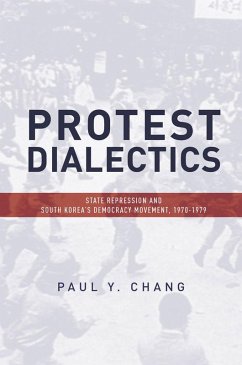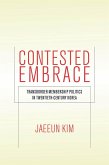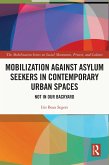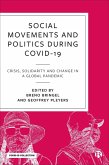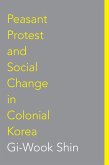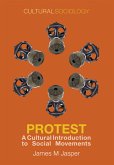Protest Dialectics (eBook, ePUB)
State Repression and South Korea's Democracy Movement, 1970-1979


Alle Infos zum eBook verschenken

Protest Dialectics (eBook, ePUB)
State Repression and South Korea's Democracy Movement, 1970-1979
- Format: ePub
- Merkliste
- Auf die Merkliste
- Bewerten Bewerten
- Teilen
- Produkt teilen
- Produkterinnerung
- Produkterinnerung

Hier können Sie sich einloggen

Bitte loggen Sie sich zunächst in Ihr Kundenkonto ein oder registrieren Sie sich bei bücher.de, um das eBook-Abo tolino select nutzen zu können.
1970s South Korea is characterized by many as the "dark age for democracy." Most scholarship on South Korea's democracy movement and civil society has focused on the "student revolution" in 1960 and the large protest cycles in the 1980s which were followed by Korea's transition to democracy in 1987. But in his groundbreaking work of political and social history of 1970s South Korea, Paul Chang highlights the importance of understanding the emergence and evolution of the democracy movement in this oft-ignored decade.
Protest Dialectics journeys back to 1970s South Korea and provides readers…mehr
- Geräte: eReader
- mit Kopierschutz
- eBook Hilfe
- Größe: 13.99MB
![Contested Embrace (eBook, ePUB) Contested Embrace (eBook, ePUB)]() Jaeeun KimContested Embrace (eBook, ePUB)22,95 €
Jaeeun KimContested Embrace (eBook, ePUB)22,95 €![Mobilization against Asylum Seekers in Contemporary Urban Spaces (eBook, ePUB) Mobilization against Asylum Seekers in Contemporary Urban Spaces (eBook, ePUB)]() Iris Beau SegersMobilization against Asylum Seekers in Contemporary Urban Spaces (eBook, ePUB)40,95 €
Iris Beau SegersMobilization against Asylum Seekers in Contemporary Urban Spaces (eBook, ePUB)40,95 €![Social Movements and Politics During COVID-19 (eBook, ePUB) Social Movements and Politics During COVID-19 (eBook, ePUB)]() Social Movements and Politics During COVID-19 (eBook, ePUB)0,00 €
Social Movements and Politics During COVID-19 (eBook, ePUB)0,00 €![Peasant Protest and Social Change in Colonial Korea (eBook, ePUB) Peasant Protest and Social Change in Colonial Korea (eBook, ePUB)]() Gi-Wook ShinPeasant Protest and Social Change in Colonial Korea (eBook, ePUB)28,95 €
Gi-Wook ShinPeasant Protest and Social Change in Colonial Korea (eBook, ePUB)28,95 €![American Democracy (eBook, ePUB) American Democracy (eBook, ePUB)]() Andrew J. PerrinAmerican Democracy (eBook, ePUB)16,99 €
Andrew J. PerrinAmerican Democracy (eBook, ePUB)16,99 €![Feminism and Protest Camps (eBook, ePUB) Feminism and Protest Camps (eBook, ePUB)]() Feminism and Protest Camps (eBook, ePUB)32,95 €
Feminism and Protest Camps (eBook, ePUB)32,95 €![Protest (eBook, ePUB) Protest (eBook, ePUB)]() James M. JasperProtest (eBook, ePUB)17,99 €
James M. JasperProtest (eBook, ePUB)17,99 €-
-
-
Protest Dialectics journeys back to 1970s South Korea and provides readers with an in-depth understanding of the numerous events in the 1970s that laid the groundwork for the 1980s democracy movement and the formation of civil society today. Chang shows how the narrative of the 1970s as democracy's "dark age" obfuscates the important material and discursive developments that became the foundations for the movement in the 1980s which, in turn, paved the way for the institutionalization of civil society after transition in 1987. To correct for these oversights in the literature and to better understand the origins of South Korea's vibrant social movement sector this book presents a comprehensive analysis of the emergence and evolution of the democracy movement in the 1970s.
Dieser Download kann aus rechtlichen Gründen nur mit Rechnungsadresse in A, D ausgeliefert werden.
- Produktdetails
- Verlag: Stanford University Press
- Seitenzahl: 312
- Erscheinungstermin: 1. April 2015
- Englisch
- ISBN-13: 9780804794305
- Artikelnr.: 48416359
- Verlag: Stanford University Press
- Seitenzahl: 312
- Erscheinungstermin: 1. April 2015
- Englisch
- ISBN-13: 9780804794305
- Artikelnr.: 48416359
Introduction: Protest Dialectics and South Korea's Democracy Movement
chapter abstract
The introductory chapter lays out the empirical and theoretical
justifications for the study. It focuses on the long historical process of
democratization in South Korea. The introduction also discusses limitations
of the sociological literature on the relationship between repression and
mobilization and argues that the present study offers a more nuanced
understanding of social movement development in highly repressive contexts.
It ends with a summary of the empirical chapters.
1The Making of the Authoritarian State
chapter abstract
Chapter 1 tracks the transformation of President Park Chung Hee's
leadership as he shifted from ruling within the parameters of a democratic
system to establishing a formal authoritarian structure in 1972. The
chapter discusses his pursuit of national security and economic development
that led to two important policy decisions in the 1960s: Korea's
participation in the Vietnam War and normalization of relations with Japan.
Intent on pushing through his policies, Park Chung Hee reverted to using
the military to put down student demonstrations, which reflected his
increasing reliance on coercive tactics to silence criticisms of his
policies. This chapter shows how this authoritarian tendency culminated in
the Yusin Constitution in 1972.
2Consolidating Authoritarianism
chapter abstract
Chapter 2 discusses the repressive structures that undergirded Park's
dictatorship including the military and the Korean Central Intelligence
Agency. In addition, based on a fairly nuanced and evolving repression
strategy, Park consolidated the authoritarian system by enacting additional
political control laws that allowed him to ignore basic rights and bypass
habeas corpus codified in his own Yusin Constitution. The promulgation of
presidential Emergency Decrees, along with the National Security Law and
the Anti-Communist Law, reflected a greater capacity for structural
repression. This chapter presents a temporal analysis of aggregate protest
data that shows that increasing state repression had a profoundly negative
impact on the ability of dissidents to stage public protests.
3The Rise and Fall of the Student Movement
chapter abstract
Chapter 3 explains how students, based on a proud history of political
engagement, made multiple attempts to organize a nationwide movement
against Park Chung Hee's government. The state, consequently, targeted the
student movement in recognition of the powerful potential of students to
galvanize social change. Increasing state repression was fueled by Park's
determination to not let large student protests develop into the kind of
"revolution" that brought down Syngman Rhee's government in 1960. This
chapter shows that the consequences of repression were dire for students as
the arrests and incarceration of thousands of student protestors led to the
rapid demobilization of their movement at two critical junctures in 1971
and 1974.
4The Emergence of Christian Activism
chapter abstract
Chapter 4 discusses the emergence of Christian activists who replaced
students as central leaders of the movement after 1975. The participation
of Christians in anti-government protests was critical to the survival of
the democracy movement and for various reasons discussed in the
chapter-including symbolic power, organizational resources, and
international connections-the state was less effective at repressing them
than other secular groups.
5The Politicization of Journalists and Lawyers
chapter abstract
Chapter 5 explores how and why journalists and lawyers became key
contributors to the democracy movement in the latter part of the 1970s.
While each addressed different aspects of Park Chung Hee's authoritarian
government, both groups came to the fore of the movement as the severity of
state repression reached new heights. The chapter shows that key state
repression strategies-the advertisement repression of newspapers in 1974,
the demobilization of students in 1974, the People's Revolutionary Party
case in 1975-motivated the politicization of new movement actors.
6Tactical Adaptation and the Rise of Human Rights
chapter abstract
Chapter 6 argues that state repression unintentionally motivated the
development of protest strategies and the movement's ideology. Because
different groups relied on tactics that were specific to their groups'
cultural norms, the demobilization of the student movement and the entry of
new movement actors altered the overall character of the movement.
Similarly, while the initial goals of the movement in the early 1970s
revolved around democratic and economic reforms, new actors further
diversified the issues that were raised in anti-government protests
including adopting the human rights discourse.
7Repression and the Formation of Alliances
chapter abstract
Chapter 7 explores an additional unintended consequence of state
repression. The diversification of movement actors provided the opportunity
to create alliances and coalitions which in turn strengthened the
solidarity of the movement. Movement solidarity, the chapter argues, was
primarily driven by the repression strategies the state employed against
dissenting groups. The impact of outgroup contention on ingroup solidarity
is evident in the formation of loose-based alliances between diverse
sectors of the democracy movement. These informal alliances, in turn, led
to formal coalitional organizations that brought together Christians,
oppositional politicians, intellectuals, and students.
Conclusion: The Legacy of the 1970s Democracy Movement
chapter abstract
The concluding chapter broadens the analytic lens by discussing the legacy
of the 1970s democracy movement for South Korea's democratization. Although
the Yusin system ended with Park Chung Hee's death in 1979, social
movements active during Park's reign continued to have consequences for the
democracy movement in the 1980s. This chapter shows how the movement in the
1980s inherited from the 1970s several important pillars of mobilization,
including a generation of leaders who came of age during the Yusin period,
organizational models, and master symbols defining the movement's ideology.
Introduction: Protest Dialectics and South Korea's Democracy Movement
chapter abstract
The introductory chapter lays out the empirical and theoretical
justifications for the study. It focuses on the long historical process of
democratization in South Korea. The introduction also discusses limitations
of the sociological literature on the relationship between repression and
mobilization and argues that the present study offers a more nuanced
understanding of social movement development in highly repressive contexts.
It ends with a summary of the empirical chapters.
1The Making of the Authoritarian State
chapter abstract
Chapter 1 tracks the transformation of President Park Chung Hee's
leadership as he shifted from ruling within the parameters of a democratic
system to establishing a formal authoritarian structure in 1972. The
chapter discusses his pursuit of national security and economic development
that led to two important policy decisions in the 1960s: Korea's
participation in the Vietnam War and normalization of relations with Japan.
Intent on pushing through his policies, Park Chung Hee reverted to using
the military to put down student demonstrations, which reflected his
increasing reliance on coercive tactics to silence criticisms of his
policies. This chapter shows how this authoritarian tendency culminated in
the Yusin Constitution in 1972.
2Consolidating Authoritarianism
chapter abstract
Chapter 2 discusses the repressive structures that undergirded Park's
dictatorship including the military and the Korean Central Intelligence
Agency. In addition, based on a fairly nuanced and evolving repression
strategy, Park consolidated the authoritarian system by enacting additional
political control laws that allowed him to ignore basic rights and bypass
habeas corpus codified in his own Yusin Constitution. The promulgation of
presidential Emergency Decrees, along with the National Security Law and
the Anti-Communist Law, reflected a greater capacity for structural
repression. This chapter presents a temporal analysis of aggregate protest
data that shows that increasing state repression had a profoundly negative
impact on the ability of dissidents to stage public protests.
3The Rise and Fall of the Student Movement
chapter abstract
Chapter 3 explains how students, based on a proud history of political
engagement, made multiple attempts to organize a nationwide movement
against Park Chung Hee's government. The state, consequently, targeted the
student movement in recognition of the powerful potential of students to
galvanize social change. Increasing state repression was fueled by Park's
determination to not let large student protests develop into the kind of
"revolution" that brought down Syngman Rhee's government in 1960. This
chapter shows that the consequences of repression were dire for students as
the arrests and incarceration of thousands of student protestors led to the
rapid demobilization of their movement at two critical junctures in 1971
and 1974.
4The Emergence of Christian Activism
chapter abstract
Chapter 4 discusses the emergence of Christian activists who replaced
students as central leaders of the movement after 1975. The participation
of Christians in anti-government protests was critical to the survival of
the democracy movement and for various reasons discussed in the
chapter-including symbolic power, organizational resources, and
international connections-the state was less effective at repressing them
than other secular groups.
5The Politicization of Journalists and Lawyers
chapter abstract
Chapter 5 explores how and why journalists and lawyers became key
contributors to the democracy movement in the latter part of the 1970s.
While each addressed different aspects of Park Chung Hee's authoritarian
government, both groups came to the fore of the movement as the severity of
state repression reached new heights. The chapter shows that key state
repression strategies-the advertisement repression of newspapers in 1974,
the demobilization of students in 1974, the People's Revolutionary Party
case in 1975-motivated the politicization of new movement actors.
6Tactical Adaptation and the Rise of Human Rights
chapter abstract
Chapter 6 argues that state repression unintentionally motivated the
development of protest strategies and the movement's ideology. Because
different groups relied on tactics that were specific to their groups'
cultural norms, the demobilization of the student movement and the entry of
new movement actors altered the overall character of the movement.
Similarly, while the initial goals of the movement in the early 1970s
revolved around democratic and economic reforms, new actors further
diversified the issues that were raised in anti-government protests
including adopting the human rights discourse.
7Repression and the Formation of Alliances
chapter abstract
Chapter 7 explores an additional unintended consequence of state
repression. The diversification of movement actors provided the opportunity
to create alliances and coalitions which in turn strengthened the
solidarity of the movement. Movement solidarity, the chapter argues, was
primarily driven by the repression strategies the state employed against
dissenting groups. The impact of outgroup contention on ingroup solidarity
is evident in the formation of loose-based alliances between diverse
sectors of the democracy movement. These informal alliances, in turn, led
to formal coalitional organizations that brought together Christians,
oppositional politicians, intellectuals, and students.
Conclusion: The Legacy of the 1970s Democracy Movement
chapter abstract
The concluding chapter broadens the analytic lens by discussing the legacy
of the 1970s democracy movement for South Korea's democratization. Although
the Yusin system ended with Park Chung Hee's death in 1979, social
movements active during Park's reign continued to have consequences for the
democracy movement in the 1980s. This chapter shows how the movement in the
1980s inherited from the 1970s several important pillars of mobilization,
including a generation of leaders who came of age during the Yusin period,
organizational models, and master symbols defining the movement's ideology.
